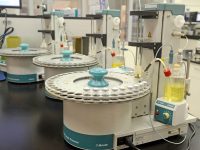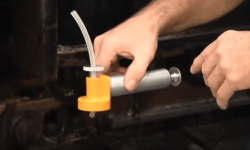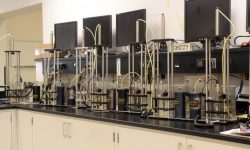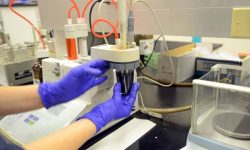Quantifying the Amount of Water:
Karl Fischer Water Test
If a crackle test is positive, further testing is needed in the form of the Karl Fischer Water Test. The Karl Fischer coulometric moisture test is a series of chemical reactions discovered in 1935 by the German chemist Karl Fischer. This method analyzes water in the microgram or parts per-million range. This test is very accurate, to .001 percent. Water determination by Karl Fischer is defined in ASTM D 6304.
For this test, a sample of oil is introduced into a titration vessel in known mass or volume. Any water present in the sample will react with iodine in the titration vessel. The amount of iodine required to react with the water and the known mass or volume of the sample is used to calculate the amount of water present in the sample. Results can be clearly expressed in percent or parts per million.
An electric current passes through a generator containing a Karl Fischer solution. Iodine is produced at the anode that consumes the water in the introduced sample. When an excess of iodine is detected, the analysis is complete. In choosing this method, make sure that test specimens are compatible with the chosen reagent and that no side reactions occur. This method is typically used to analyze hydrocarbons, alcohols, and ethers. Note: Analysis of ketones must employ a Karl Fischer solution that is specifically formulated for ketone analysis.
Low levels of water (less than 2 percent) are typically the result of condensation. Higher levels can indicate a source of water ingress. Water can enter a system through seals, breathers, hatches, and fill caps. Internal leaks from heat exchangers and water jackets are other potential sources.
When free water is present in oil, it poses a serious threat to the equipment. Water is a very poor lubricant and promotes rust and corrosion to the components. Dissolved water in an oil promotes oil oxidation and reduces the load-handling ability of the oil. Water contamination can also cause the oil’s additive package to precipitate. Water in any form causes accelerated wear, increased friction, and high operating temperatures. If left unchecked, water can lead to premature component failure. In most systems, water should not exceed 500 ppm.
Watch a short video about how the Karl Fischer Test is performed.






